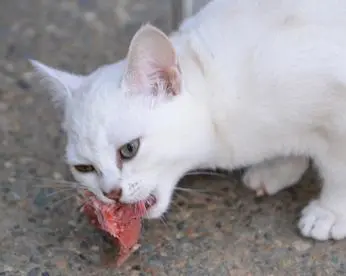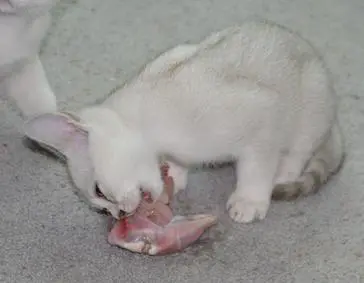Raw Feeding

This may come as a surprise, but cats are obligate carnivores. Their digestive systems are specifically designed for muscle meat, bone and organs. Digesting grains, cooked and processed foods is very difficult for them and often responsible for so many illnesses including allergic reactions, infections, diabetes, renal failure and cancer.
The pet food industry pays for the majority of research on pet foods. Deciding which research to trust can be confusing when what you read is funded by the companies that profit from it. Purina, Science Diet and Royal Canin are the big players in the pet food market.
Here is a simple fact; cooking meat degrades the nutrients. Vitamins, minerals, and amino acids (Gerber) are reduced or destroyed during the cooking process and nearly all dry and canned pet foods are cooked. Other ingredients must be added back in to attempt to replace what was lost during the cooking, but often these ingredients are plant-based. The "inability of cats to adapt enzyme activity to increased dietary carbohydrate concentrations" is another proven fact (Verbrugghe). This means the cat's body does not have the proper enzymes to breakdown and utilize ingredients from most non-meat sources. Cats get little nutritional value from ingredients other than meat, organ, and bone.
Another reason we advocate raw feeding is the amount of moisture present. Raw food maintains a cat's proper hydration level. Originating in Africa, cats do not have a high drive to drink. Being forever stoic, cats do not tell us when they are not feeling well until it is too late. Thus, the effects of low-grade dehydration work away at a cat's body for years before being realized (“Dehydration in Cats"). Dehydration leads to kidney failure and cats typically do not show signs of kidney failure until 70-75% of their kidney function is lost. Young cats who are fed dry kibble start out living normal, healthy lives. A study in Karolinska Hospital in Stockholm, Sweden shows that upon reaching adulthood, the rate at which kibble-fed cats age and develop degenerative diseases increases at an abnormal rate. In comparison, cats fed a non-processed, natural diet did not age as quickly and, most importantly, did not develop ANY degenerative diseases (Appel).

Many people are nervous, with good reason, about feeding raw. The worst food you can feed is unbalanced raw food. If you don't feed raw correctly, you can negatively impact your cat's health. The easiest way to feed raw is to purchase raw cat food that is pre-made and already nutritionally balanced. We have a list of raw food recommendations on our Cat Related Links page. Some ship to your door; others have to be purchased in a pet store. You can use the website's store locator to find your closest distributor.
Another reason people are initially nervous about the idea of feeding raw is an assumption that it is dangerous for cats, because humans can become ill from eating under-cooked meat. Humans and cats have entirely different digestive systems. Also, there are articles published by the big pet food companies and veterinary hospitals which outright state feeding raw will make your cat sick or even kill it!
What We Feed
We have a breeding program and feed many cats, so the way we feed our cats may not be conducive to the way a family will feed one or two cats. Our basic goal is to feed multiple protein sources which are as close to being feline biologically appropriate as possible. If money were not a factor, we would feed rats, mice, rabbits and quail, which are all prey items that a cat could catch.
But the reality is that some of those foods are not affordable or easy to raise. Our number one goal is to offer our cats four or more different protein sources for a variety of nutrients. Our diet includes chicken, duck, turkey, pork, beef, and occasionally rabbit, quail and mice.
We make most of our food; however, also use Darwin's and Viva and continue to add more variety to our cats' diets.
In addition to veterinarians opposed to raw food, there are many who endorse it.
Should You Feed Your Cat a Raw Diet? A Vet’s View
Works Cited:
Appel, Athena. "What You Can’t See Won’t Hurt Your Pet?"
Cats and DogsNaturally. 4 March 2013.
“Dehydration in Cats: How Can You Tell If a Cat Is Dehydrated?” CatHealth.com
We have coached many pet owners on getting started with raw feeding. It does seem weird at first, but once you get the hang of it, it's easy. Many animals take to raw food immediately and others require time and patience. Animals which have become "carb-hooked" may not initially recognize meat as food. Remember, we were once beginners too and have battled through the strange feelings of feeding raw meat to our domestic animals and the skepticism of our family and veterinarians. Many respected veterinarians are in favor of raw feeding. Though many others are unwilling to challenge what they have always been told, so may not support your choice. Please don't just take our word for it that cats (and dogs) should be eating muscle meat, bone & organ meat. Please take a look at the websites below, the research and then come to your own conclusions on raw feeding.
